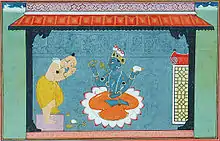Nila Devi
Nila Devi (spelt also as Niladevi and Neela Devi) or Nila is a regional Hindu goddess and the third consort of the god Vishnu, along with Shridevi (Lakshmi) and Bhudevi (the Goddess of the Earth).[1] She becomes the consort of Vishnu in his avatar as Krishna.[2] She is popular in South India, particular in Tamil culture as a consort of Vishnu.[2][3] Nila devi's forms include Nagnajiti, Vimathgira, Mathithegi, Rathyambala and Risanika. Nila devi is identified with Nagnajiti a wife of Krishna or Nappinnai (Pinnai, a favourite Gopi of Krishna in Tamil tradition).[4][2]
| Nila Devi | |
|---|---|
.JPG.webp) Festival image of Nila (left to the image of Vishnu) in Thirukkadigai | |
| Other names | Nappinnai, Nagnajiti, Vimathgira, Mathithegi, Rathyambala and Risanika |
| Affiliation | Devi |
| Abode | Vaikuntha |
| Consort | Vishnu |
| Part of a series on |
| Vaishnavism |
|---|
 |
|
|
Niladevi appears in the Vaikhanasa Agama text.[4][5][3] Some texts mention that Vishnu's Iccha shakti takes three forms: Shridevi, Bhudevi and Niladevi, representing the three gunas; The Sita Upanishad mentions that these three forms as those of goddess Sita; Niladevi is associated with tamas.[2] Niladevi besides tamas, is associated with the sun, the moon and fire.[2] She appears as Krishna's gopi in Cherusseri Namboothiri's Krishnagatha.[2]
According to a dhyana mantra of Vishnu, in his Param aspect, he is depicted seated on the serpent Shesha with Lakshmi on his right and Bhudevi and Niladevi on his left.[6] Niladevi may be also depicted standing behind Vishnu with his two co-wives.[5] In a depiction in the British Museum, Vishnu as Vaikuntha-natha ("Lord of Vaikuntha) is seated on Shesha between Lakshmi and Bhudevi, while his foot is supported by Niladevi.[5]
The saint-poetess Andal is sometimes considered by the Sri Vaishnava sect as an aspect of Niladevi.[6][7]
Nappinnai
Nappinnai – Krishna cult is mainly limited to the Tamil-speaking world. The name Nappinnai is found in Divya Prabandha of Alvars and Silappadikaram.[8] Andal (one of the Alvars) wanted to perform devotion to her Krishna like Gopikas did in Dvapara Yuga. She in her Tiruppavai, wakes up Nappinai before waking up Krishna. As per Srivaishnavism, complete surrender to the Lord is performed through his consort and in Sri Krishnaavatharam specifically, it is performed through Nappinai.[8]
Neela devi took incarnation as Nagnajiti, daughter of Kumbagan (brother of Yashoda) and Krishna won her hand after conquering the seven ferocious bulls of her father. Nappinnai's brother is Sudama. Sri Parasara Bhattar describes Krishna, intoxicated by her beauty, as "Neela thunga sthana giri thati suptham".
Velukkudi Swamy, a proponent of Vishishtadvaita Philosophy says that Andal, singing Nachiar Tirumozhi as the daughter of Periyalvar, mentions about Rukmini. But singing as a Gopika in Thiruppavai she mentions only Nappinnai. Alvar mentions the three nachiars (consorts) as Pon mangai (Sri devi), nila mangai (Bhudevi) and pula mangai (Neela Devi) the consort of senses. It is Neela devi who keeps Bhagavan under control by her bhogam. Swami Vedanta Desika says in Daya satakam - "nisAmayatu mAm nIla yat bhOga patalai: druvam". Lord Krishna was a Yadava kshatriya varna by birth, thus he married Rukmini according to that. He was brought up as a Yadava vaishya by varna (gopa), hence he married Nappinnai according to that. Neela suuktam also says - ghruNAhi - ghrutavai - payasvati, etc., mentioning the characteristics of a gopika.
References
- M., Ramanan. "ĀNDĀL'S "TIRUPĀVAI". Journal of South Asian Literature. 24 (2): 51–64. Retrieved 11 January 2021 – via JSTOR.
- Dalal, Roshen, 1952- (2010). Hinduism : an alphabetical guide. New Delhi: Penguin Books. pp. 272, 282. ISBN 978-0-14-341421-6. OCLC 664683680.CS1 maint: multiple names: authors list (link)
- "album; painting | British Museum". The British Museum. Retrieved 2021-01-10.
- Chandra, S. (1998). Encyclopaedia of Hindu Gods and Goddesses. Sarup & Sons. p. 238. ISBN 978-81-7625-039-9. Retrieved 2021-01-10.
- Museum, British; Dallapiccola, Anna Libera (2010). South Indian Paintings: A Catalogue of the British Museum Collection. British Museum Press. pp. 49, 76. ISBN 978-0-7141-2424-7.
- Srinivasan, T. N. (1982). A Hand Book of South Indian Images: An Introduction to the Study of Hindu Iconography. Tirumalai-Tirupati Devasthanams. pp. 96, 115.
- Bryant, Edwin F. (2007-06-18). Krishna: A Sourcebook. Oxford University Press. p. 189. ISBN 978-0-19-972431-4.
- Parthasarathy, Indira (2005). Krishna Krishna (in Tamil). Kizhakku. p. 33. ISBN 9788183680806.
